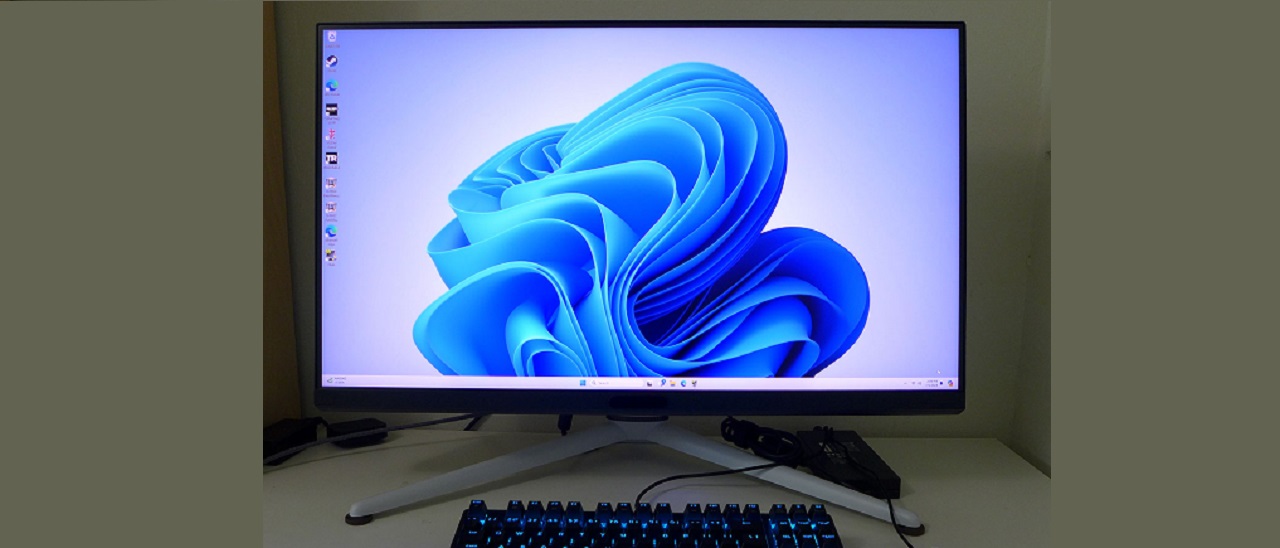Why you can trust Tom's Hardware
If you’re shopping 4K gaming monitors, note that most of them top out at 144 Hz. The EX321UX is in that category, along with the Corsair 32UHD144, AOC PD32M and Gigabyte M32UC. You can get 160 Hz from Acer’s Predator X32 and at the speedy end of the scale is Samsung’s Odyssey Neo G8 which hits 240 Hz.
Pixel Response and Input Lag
Click here to read up on our pixel response and input lag testing procedures.
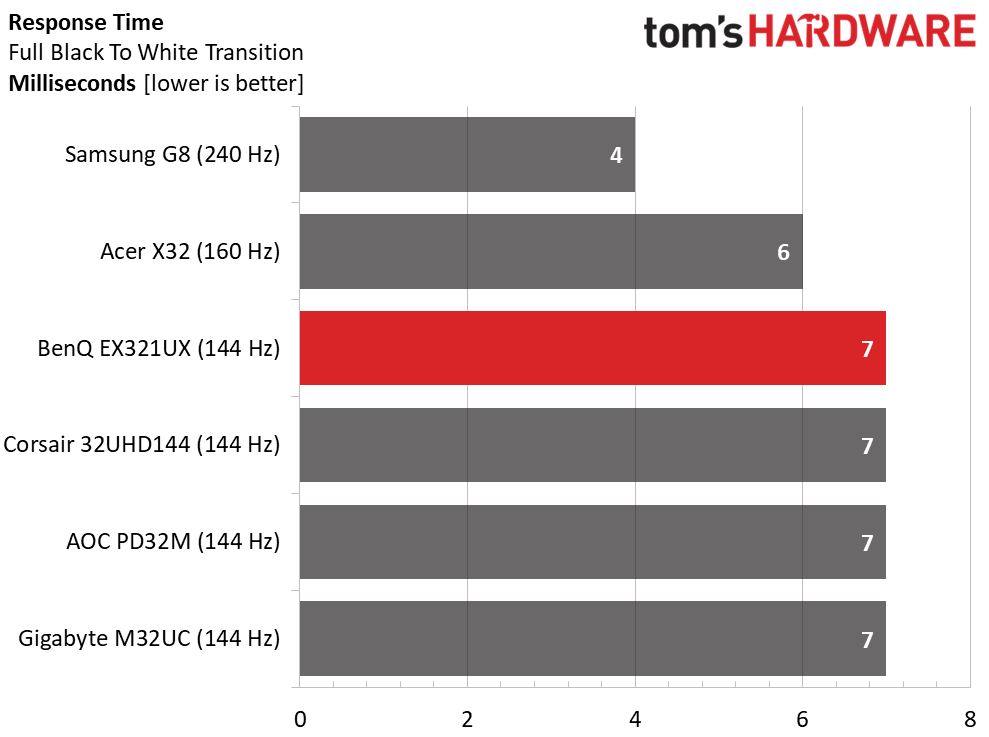
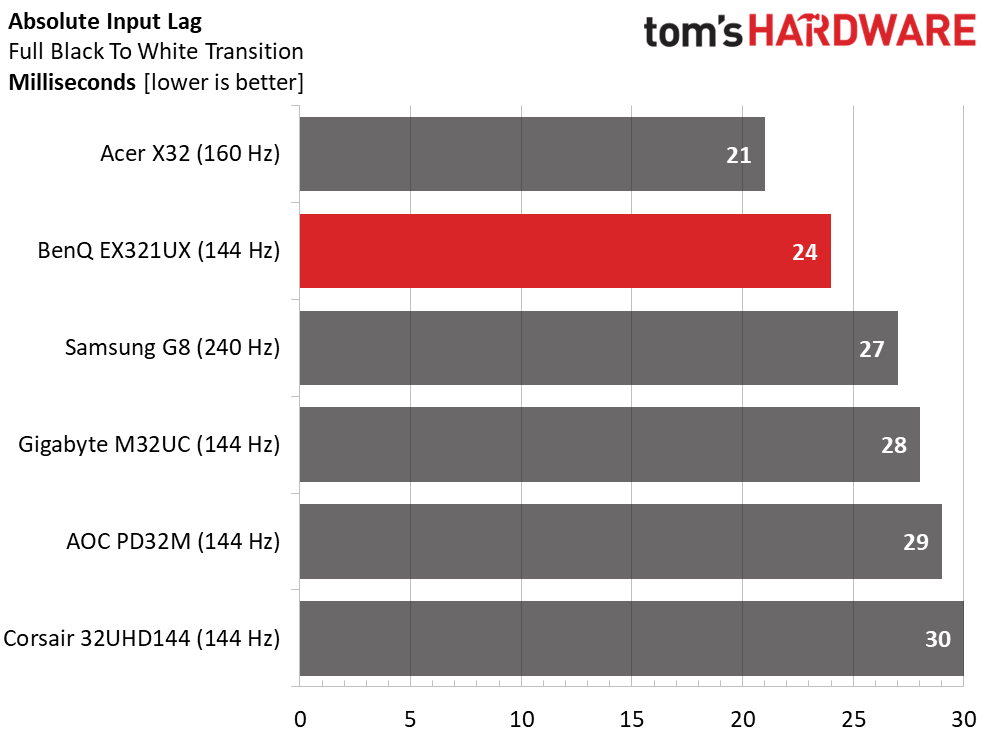
The G8 delivers the smoothest motion processing but you’ll need a top-end video card to even crack 200fps at 3840x2160 pixels. The EX321UX and other 144 Hz UHD monitors will work with a wider variety of systems though you’ll still need some power to maintain 144fps. 7ms is a typical draw time for these monitors. The EX321UX improves on the other three screens with a more precise overdrive that mitigates blur without ghosting.
It also has extremely low input lag and manages to beat the Samsung by 3ms, which is no small feat. The Acer is the best of the lot in that test and is well-suited for pro-level competition. But the EX321UX is qualified too. It doesn’t have a backlight strobe, but the overdrive makes that feature unnecessary.
Test Takeaway: Most pro gamers will sacrifice resolution for higher frame rates, but if you want 4K, the EX321UX is one of the best, thanks to its precise overdrive. OLED is still a better choice for ultimate performance and image quality, but the EX321UX’s Mini LED panel is much brighter than any OLED. If you need 1,200-nit HDR and 4K resolution, it’s one of the best gaming monitors you can get.
Viewing Angles
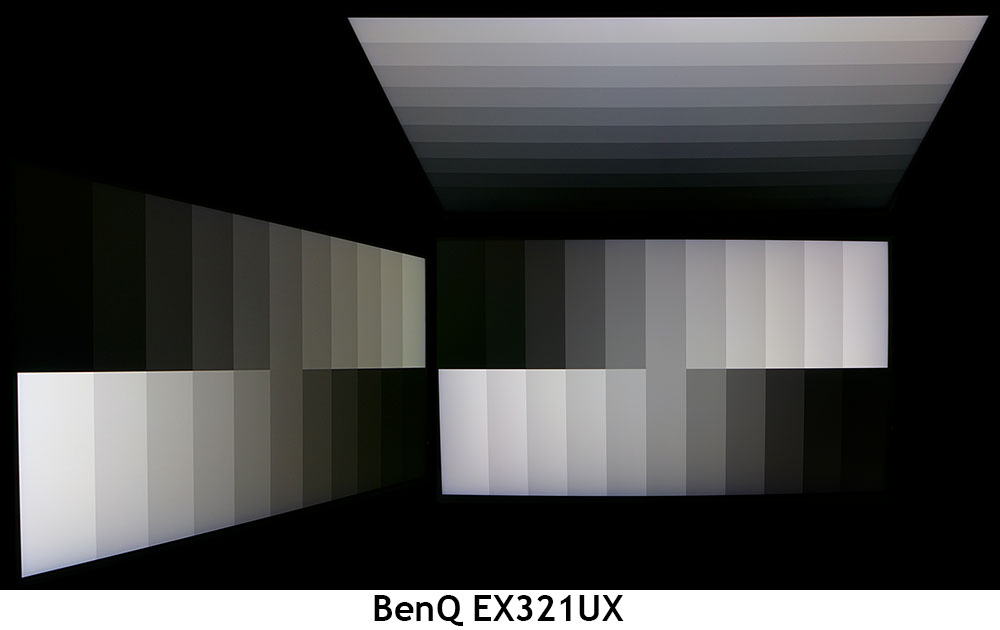
The EX321UX’s viewing angles are typical of premium IPS panels. You can see a green shift at 45 degrees to the side, but there is no appreciable reduction in light output or gamma, which is a very good thing. The top view is cool in tone with a 40% drop in brightness and washed-out gamma. Overall, though, this is excellent performance for an LCD monitor.
Screen Uniformity
To learn how we measure screen uniformity, click here.
Get Tom's Hardware's best news and in-depth reviews, straight to your inbox.
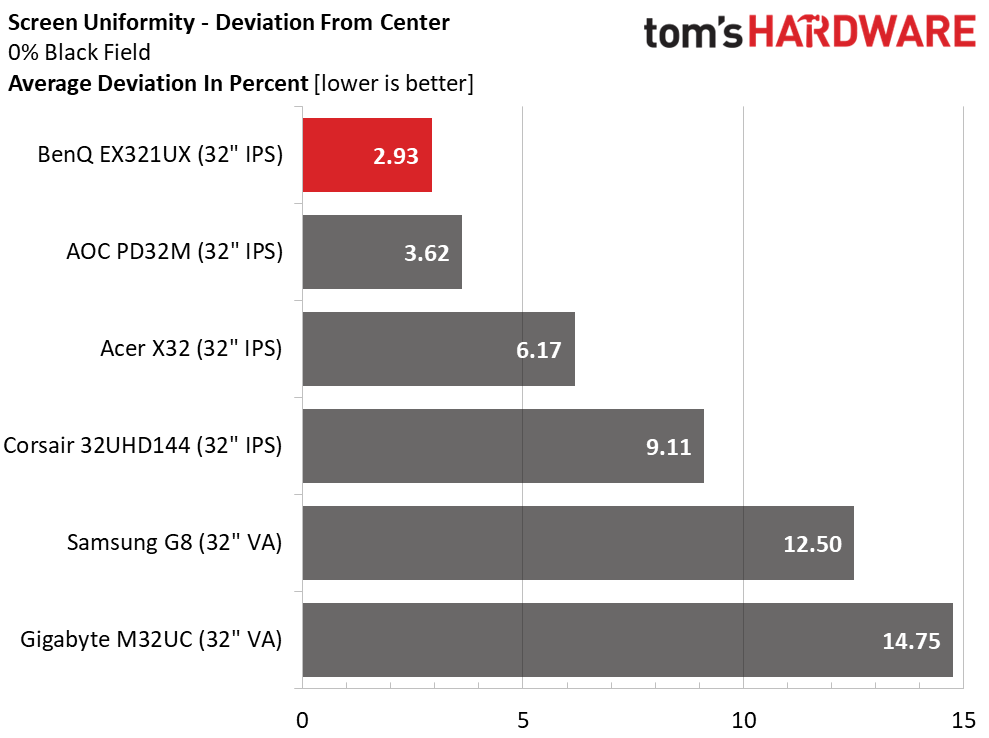
The EX321UX has a uniformity compensation feature but it is completely unnecessary. I turned it off and measured 2.93% deviation which is one of the lowest scores I’ve ever recorded. Turning UC on only serves to reduce contrast anyway. There was no hint of bleed or glow from my sample. It doesn’t get much better than this.
MORE: Best Gaming Monitors
MORE: How We Test PC Monitors
MORE: How to Buy a PC Monitor
MORE: How to Choose the Best HDR Monitor
Current page: Response, Input Lag, Viewing Angles and Uniformity
Prev Page Features and Specifications Next Page Brightness and Contrast
Christian Eberle is a Contributing Editor for Tom's Hardware US. He's a veteran reviewer of A/V equipment, specializing in monitors. Christian began his obsession with tech when he built his first PC in 1991, a 286 running DOS 3.0 at a blazing 12MHz. In 2006, he undertook training from the Imaging Science Foundation in video calibration and testing and thus started a passion for precise imaging that persists to this day. He is also a professional musician with a degree from the New England Conservatory as a classical bassoonist which he used to good effect as a performer with the West Point Army Band from 1987 to 2013. He enjoys watching movies and listening to high-end audio in his custom-built home theater and can be seen riding trails near his home on a race-ready ICE VTX recumbent trike. Christian enjoys the endless summer in Florida where he lives with his wife and Chihuahua and plays with orchestras around the state.
-
DavidLejdar Reply
Somewhat, yeah. E.g. the Gigabyte M32U is a lot cheaper, and moreorlees competitive in the posted benchmarks. But where it trails behind, is about HDR, where it comes to "only" HDR400. And that's where the Mini LED of the EX321UX shows, instead of LCD with M32U.brandonjclark said:Hrmm, it's IPS and not OLED. That's kind of expensive for IPS tech, right?
And when one is looking for high HDR, 32 inch, 4K and FPS, most other screens seems to be at around the same price, except for perhaps the Acer X32QFS. -
npyrhone This does NOT have DP2.1. Display port is limited to DP1.4. That is a common hoax or loophole with monitors nowadays, that it can be called 2.1 even when the bandwidth limitation is identical to 1.4. This should always be called out!Reply -
joey22 Hi! Can you share the color settings you landed on with the SciFi HDR mode? I have had this monitor for a few weeks and have struggled to get a good color setting with the "genre" HDR modes and agree that it looks best in DisplayHDR but then you don't get the local dimming and better backlight control.Reply
I have found "Realistic" to be the best HDR setting for me for gaming but still am not 100% satisfied with it. Overall I'm happy with the monitor, but do wish they would provide some firmware updates as you and other reviewers have suggested. For what it's worth, my usage scenario is 80% productivity / 20% gaming and didn't want to deal with the text clarity or burn in compromises with an OLED. -
FoxTread3 August 18, 2024 - As usual with the Tom's Hardware reviews. There are enough details to make your eyes bleed, and your brain go numb. But that's why we're here.. to get the information. Call me what you like, but I much prefer OLED screens. I have an OLED LG 55" TV, an OLED Samsung Chromebook, and an Alienware 34" OLED monitor. I love all three of them and have no complaints. I also have a seven year old Dell 32" HDR LCD monitor whose model number I'm too lazy to look up now, but is still doing quite well. As I recall I paid well over a thousand dollars for it. As I wrote these comments I did look on Dell's PC monitor page, and see that they have quite an inventory of 4K monitors hundreds of dollars less than the benQ reviewed in this article. It would be interesting see how the less expensive Dell monitors stack up against the benQ. All said and done. I'll stick with OLEDs until the "next best and greatest thing" arrives on the market. :giggle:Reply
